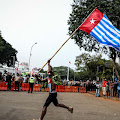masukkan script iklan disini
In the Indonesian's atlas the western part of New Guinea is called Irian. No one is quite sure what the word signifies. One theory is that it means nothing, another that it means "warm land." It is, indeed, a torrid jungle and mountain wilderness as big as California. Sparsely inhabited by fuzzy-wuzzy Melanesian cannibals and practically unexploited, it has been a Dutch colony the past 122 years. Last week Irian was also a hot focus of argument between its Dutch rulers and the bumptious young Republic of Indonesia.
In the Indonesian's atlas the western part of New Guinea is called Irian. No one is quite sure what the word signifies. One theory is that it means nothing, another that it means "warm land." It is, indeed, a torrid jungle and mountain wilderness as big as California. Sparsely inhabited by fuzzy-wuzzy Melanesian cannibals and practically unexploited, it has been a Dutch colony the past 122 years. Last week Irian was also a hot focus of argument between its Dutch rulers and the bumptious young Republic of Indonesia.
The dispute began in the postwar struggle of the Indies. When the Dutch recognized Indonesia's independence (in November 1949), it was agreed that the status of Irian, which both countries claimed, would be settled at a conference to be held within a year.
As months passed and conference time approached, Irian became more & more involved in local Indonesian politics. President Soekarno insisted the controversial territory must belong to Indonesia. It was a popular issue; the new state's politicos drummed it up, for it helped detract attention from such internal difficulties as banditry and inflation.
The Australians, who rule East New Guinea, backed the Dutch; they let it be known that they would rather take over the island's western half than see it in Indonesian hands.
Against this background last week Dutch and Indonesian representatives met in The Hague for the parley that would determine Irian's destiny. Soekarno's men, led by Foreign Minister Mohamed Rum, demanded control within six months. Led by Foreign Minister Dirk Stikker, The Netherlands' men testily replied that they could not negotiate on the basis of such a proposal. They argued, in effect, that they were more capable and responsible colonial administrators than the untried Indonesians, and that West New Guinea's primitive inhabitants needed their benevolent aid. "Whoever calls this task of civilization colonialism," a Dutch spokesman said, "uses an ugly qualification for a splendid task."
The Indonesians sniffed suspiciously and rejected the Dutch answer. This week the conferees continued their talks and a search for a compromise.
INDONESIA: Ire over Irian
In the Indonesian's atlas the western part of New Guinea is called Irian. No one is quite sure what the word signifies. One theory is that it means nothing, another that it means "warm land." It is, indeed, a torrid jungle and mountain wilderness as big as California. Sparsely inhabited by fuzzy-wuzzy Melanesian cannibals and practically unexploited, it has been a Dutch colony the past 122 years. Last week Irian was also a hot focus of argument between its Dutch rulers and the bumptious young Republic of Indonesia.
The dispute began in the postwar struggle of the Indies. When the Dutch recognized Indonesia's independence (in November 1949), it was agreed that the status of Irian, which both countries claimed, would be settled at a conference to be held within a year.
As months passed and conference time approached, Irian became more & more involved in local Indonesian politics. President Soekarno insisted the controversial territory must belong to Indonesia. It was a popular issue; the new state's politicos drummed it up, for it helped detract attention from such internal difficulties as banditry and inflation.
The Australians, who rule East New Guinea, backed the Dutch; they let it be known that they would rather take over the island's western half than see it in Indonesian hands.
Against this background last week Dutch and Indonesian representatives met in The Hague for the parley that would determine Irian's destiny. Soekarno's men, led by Foreign Minister Mohamed Rum, demanded control within six months. Led by Foreign Minister Dirk Stikker, The Netherlands' men testily replied that they could not negotiate on the basis of such a proposal. They argued, in effect, that they were more capable and responsible colonial administrators than the untried Indonesians, and that West New Guinea's primitive inhabitants needed their benevolent aid. "Whoever calls this task of civilization colonialism," a Dutch spokesman said, "uses an ugly qualification for a splendid task."
The Indonesians sniffed suspiciously and rejected the Dutch answer. This week the conferees continued their talks and a search for a compromise.
INDONESIA: Ire over Irian






